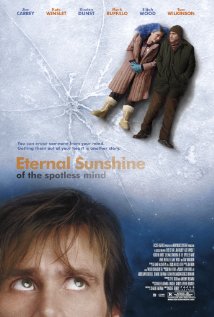Re:View| Eternal Sunshine of the Spotless Mind
 I have often felt an ache that is hard to describe. You may have felt it yourself. It’s not physical, but emotional. Not painful per say, but rather, unquenchable. Throughout human history, many of the greatest writers and scholars have tried to describe this same feeling I have felt, only to come up lacking. And so we give it a word- love, and do our damnedest to articulate what that means.
I have often felt an ache that is hard to describe. You may have felt it yourself. It’s not physical, but emotional. Not painful per say, but rather, unquenchable. Throughout human history, many of the greatest writers and scholars have tried to describe this same feeling I have felt, only to come up lacking. And so we give it a word- love, and do our damnedest to articulate what that means.
A pretty good example of this thing we call love is found in Eternal Sunshine of the Spotless Mind. It is a wonder of an experience and a powerful illustration of the eternality of that curious feeling. If you have loved someone, and/or continue to, you understand this feeling I am describing. I love my wife and my daughter with an extremely potent version of that stomach- pit ache. And it is the reason I connect so much with this film, that I can easily call my favorite film of all time.
The film’s central characters couldn’t be more different. Joel Barish is sheepish and safe, Clementine Kruczynski is loud and a risk taker. But their polar opposites attract and each is helpless for the other. Love, as it often does, removes the labels and the characteristics and connects their hearts. This is why the harrowing journey we follow Joel on, as he tries to retain his memories of their relationship, is so much more visceral and relatable. Joel and Clementine shouldn’t work. They aren’t your cookie cutter couple peeled from the pages of a magazine. They don’t follow the typical formula. So it must be a strong love that they share in order for them to work.
Yet after a two-year relationship, they run into pain and it causes them to run away from this love. Far away. Far enough, in fact, that they attempt to erase all memory of what they shared through the help of a quirky little operation called Lacuna, Inc., which claims to offer the ability to allow one to move on, lobotomizing the pain over night. It’s a science fiction concept, but one not too audacious. Why? Because if you’ve felt the pain of hurt from one you love, you don’t have to ask that question.
From this, the film goes on to explore its central question- is love strong enough to defy such a concept? This theme is also addressed in the poem Eloisa to Abelard by Alexander Pope, from which the film derives its title.
How happy is the blameless vessel’s lot!
The world forgetting, by the world forgot.
Eternal sunshine of the spotless mind!
Each pray’r accepted, and each wish resign’d.
This now popular excerpt from the poem is recited in the film, and focuses on the idea that ignorance is bliss. The speaker in the poem is Eloisa, who has been eternally separated from Abelard whom she passionately loves. Knowing she can never be with him again, she no longer pines for reconnection but rather longs to forget him altogether believing the anguish too great to bear. The conceit is that if one forgets all they experience, and so too the world forgets them, then they are inherently blameless of all action and could live eternally happy. Blissful in their ignorance.
Yet what would become of this blameless vessel? Is it better to experience the pain of love than to never have experienced anything at all? The film offers the idea that it wouldn’t matter either way. Love would find you regardless.
Love is patient and kind; love does not envy or boast; it is not arrogant or rude. It does not insist on its own way; it is not irritable or resentful; it does not rejoice at wrongdoing, but rejoices with the truth. Love bears all things, believes all things, hopes all things, endures all things. -1 Corinthians 13: 4-7
 We live in a culture that doesn’t value love. Not really. It celebrates the colorful moments, pushing romance and sex as the ideal. But love isn’t what it’s cracked up to be in the movies. Love is overloaded laundry baskets, day-old dirty dishes, uncomfortable visits to in-laws, Netflix binges on a quiet Saturday. It is patient. It is kind. It is not rude or arrogant. It takes its time, long suffering through all the inanity in life. And therein lies the power.
We live in a culture that doesn’t value love. Not really. It celebrates the colorful moments, pushing romance and sex as the ideal. But love isn’t what it’s cracked up to be in the movies. Love is overloaded laundry baskets, day-old dirty dishes, uncomfortable visits to in-laws, Netflix binges on a quiet Saturday. It is patient. It is kind. It is not rude or arrogant. It takes its time, long suffering through all the inanity in life. And therein lies the power.
Love’s power is not in its ability to wow us with romantic fireworks. Those are nice, but also fleeting. Love’s power is in its unwavering nature to last. It continues on despite the ideologies we try so hard to encapsulate it in.
We often think we have love figured out. We want to set up rules around it, try to box it in and make it give us the life we think we deserve. But it never fails to give us something greater- eternality.
Imagine for a second all the times you’ve heard the phrase “God is love.” You might think that sounds pretty. It probably conjures up images of pink hearts, radiant clouds and sugary candies. It’s a phrase that has unfortunately been used to paint a picture of a God who is soft, cushy, and safe.
But God is love, and love is not safe. If love bears all things, endures all things, then it goes with us on our journey and sees our deepest truths. And it doesn’t care. Love, real love, the kind that aches within and cannot be accurately described by even the greatest wordsmiths, never fails no matter what face we show to it. That is love, and love is God.
When we imperfect creatures attempt to love truly, we so often mishandle it and hurt each other. Imagine that ache in your stomach being betrayed. How could one not want to forget something like that, if only briefly? But God is the love that is eternal, the true love that does not waver in the face of our reality.
So what are we as fallible beings, incapable of this kind of perfect love, to do? Clementine says something to Joel that stuck with me on my most recent viewing of the film. She says, “People have to share things, Joel. That’s what intimacy is.” That’s probably the best we can do, open ourselves to being vulnerable and known truly by those we love. It will always more painful than strapping ourselves to a machine that will erase the memories of the hurt, but it will be the only thing that lasts.
Because run from it all you want, love will still find you. Though it isn’t always sunny, it is eternal.







